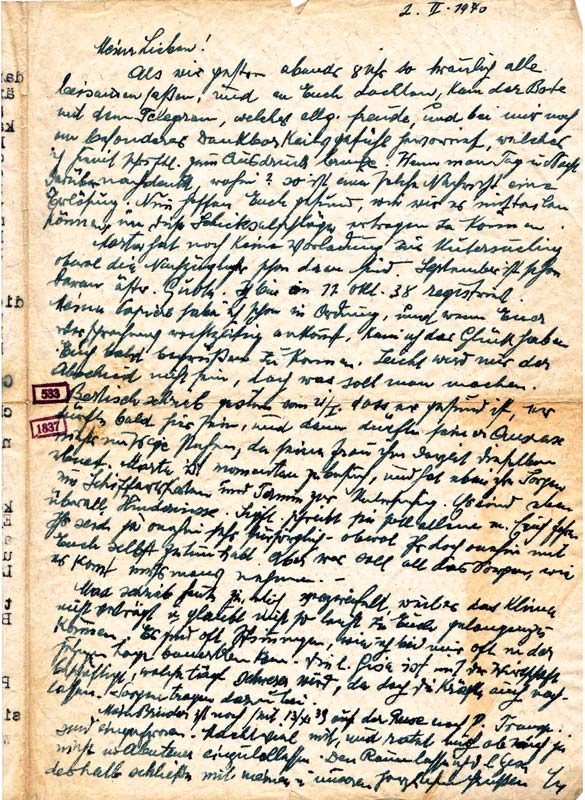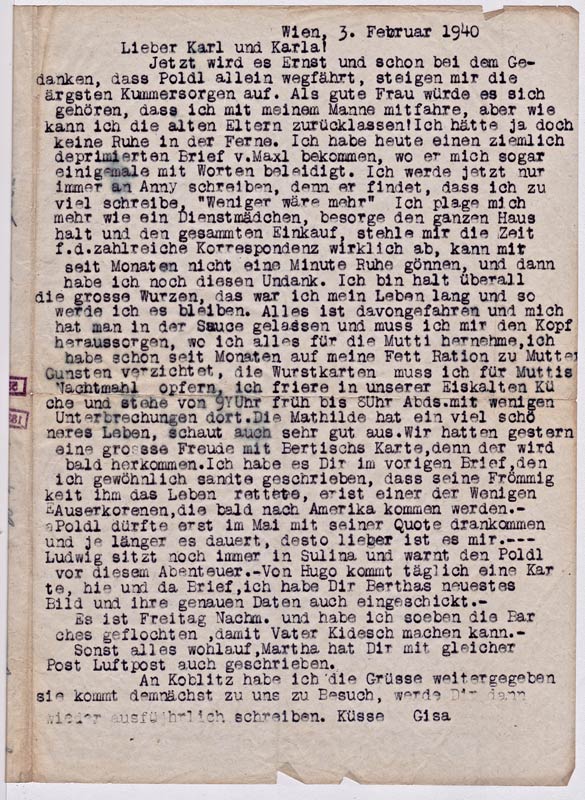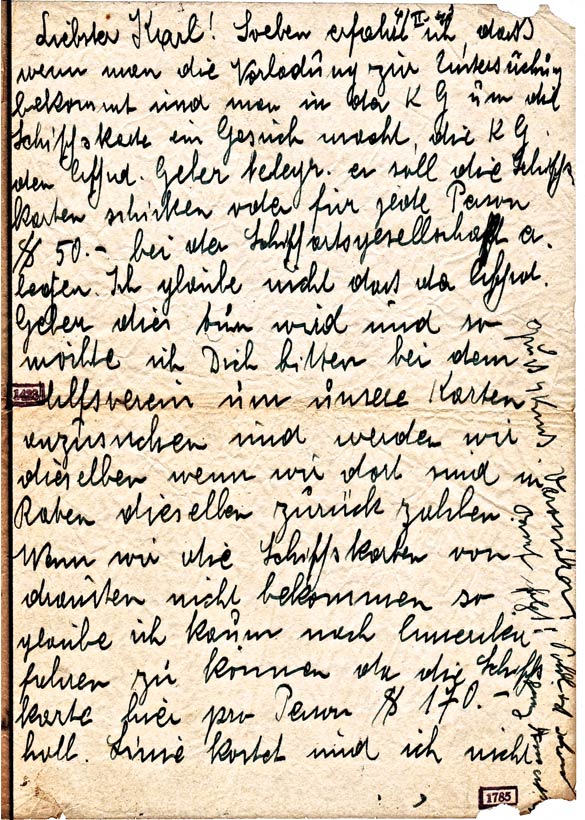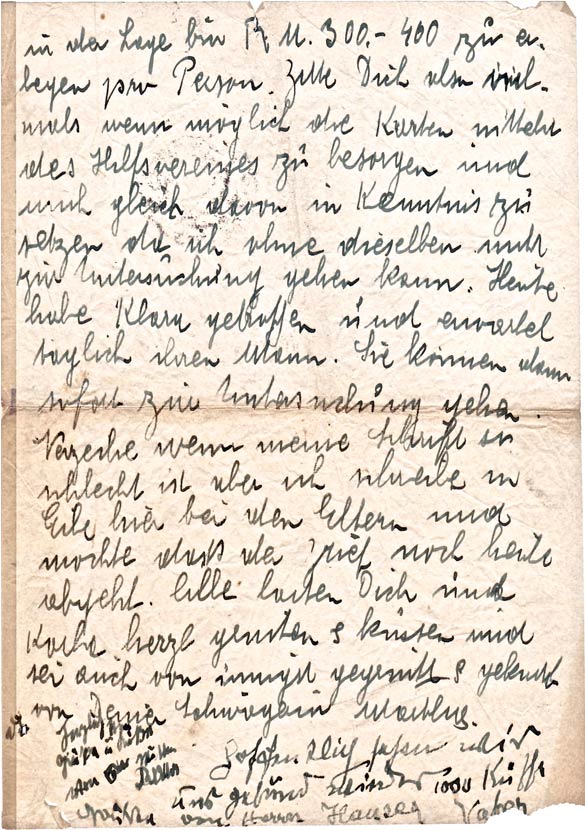

Author(s) / Origin of Letter |
Recipient(s) / Relationship to Author(s) / Destination of Letter |
Summary |
Gisela Jellinek Schlesinger
Leopold Schlesinger (see Gisela Jellinek Schlesinger's bio Martha H. Jellinek (see Siegfried Jellinek's bio [Vienna, Austria] |
Karl Jellinek (brother of GJS, brother-in-law of LS and MHJ)
Kreindel/Karla E. Jellinek (sister-in-law of GJS, LS, and MHJ) (see Karl Jellinek's bio) [New York City, USA] |
Gisela is deeply conficted about escaping to the US with her husband, Leopold, and leaving her elderly parents behind in Vienna. Gisela also describes being weary of all the hard work involved in caring for her Leopold writes of the joy and gratitude he feels for the "redemptive" news of a forthcoming affidavit (and possibly, ship tickets) from Karl and Karla. Leopold continues his somewhat resigned, philiosophical and cryptic writing concerning his own emigration, as well as the emigration struggles and hopes of his brother, brothers and sisters-in-law, and members of Karla's family. Martha H. Jellinek's hurried letter requests specific assistance from Karl regarding payment and receipt of ship tickets for her family's escape from Austria. Martha explains the urgency of having the ship tickets in her possession. |
February 2, 1940 As we were all comfortably sitting together at 8 o'clock last night, and thinking of you, the messenger arrived with the telegram, which caused joy amongst all of us and particularly in me [caused] a feeling of special gratitude, which I hope herewith to express in writing. When day and night, all one can ponder is where to go ? then such a bit of news is of redemptive quality. Now we hope that you are all healthy, as we must be in order to endure these strokes of fate. Marta still hasn't received the summons for the [medical] examination even though it is already the latecomers' turn. The Austrian quota is already at September. I registered on 17 October 1938. My papers are all in order and if your promise comes in time, I can have the happiness of greeting you soon. The farewell will not be easy for me, but what is one to do. Bertisch's letter of January 21, that we received yesterday, told that he is healthy; he should be here soon and then nothing should impede his departure, since right now his wife is paving the way for him. Marta is currently visiting and has her worries with ship tickets and the examination appointment — there are obstacles simply everywhere. Sigfr.[ied] writes that she should go to you alone. You are of course, very thoughtful in any case — even though, after all, you have enough to do just [worrying about] yourselves. But what's the use of all this worrying, one has to take it as it comes. Max wrote rather despairingly today because he cannot tolerate the climate, he doesn't think he will be able to reach you easily. These are often the same sentiments which I notice in myself in this same situation. Dear Gisa is busy with the business, which becomes more difficult with every passing day because strength ebbs. Worries contribute to this. My brother has been on the journey to P.[alestine] since 13 November 1939. Transp[orts] have been halted. [He] is going through a lot of trouble and advises you not to get tangled up in any adventures. I leave [the rest of] the space for dear Gisa and thus close with my and our heartfelt greetings. "L," [ followed by "s" ?] [Leopold (Poldi) Schlesinger's initial or initials ?] |  |
Translated by JD, AR and JL of staff of Leo Baeck Institute, NYC; edited by Barbara Sommerschuh of Sütterlinstube, Hamburg, Germany
Footnotes
1. Wohin can mean literally, "where to", as in "to where shall/can one go," but it can also be used in a more philosophical sense to signify a general" where is the world/mankind heading? Not possible to know what the author intended, perhaps a bit of both. [end of 1st Transl. note] The contents and context of this particular sentence and all of Leopold's letter makes it very likely that he meant "where to go," mainly or entirely, in the literal sense. However, Leopold's use of the word "redemptive" in this same sentence and "strokes of fate" in the next sentence, suggests that Leopold may have also been thinking in a broader, more philosophical way.
2. This probably means that the US consulate in Vienna had reached the point of granting visas to people who had registered for an immigration visa by September 1938.
3. This "promise" likely referred to an affidavit and/or ship tickets that Leopold needed before he could obtain the requisite visa from the American consulate in Vienna. However, twenty-six months later, Leopold and Gisela were still in Vienna and were deported from there to be murdered. See Gisela Jellinek Schlesinger Bio.
4. This sentence refers to Sacher Bertisch's impending release from Buchenwald concentration camp because his wife, Clara, had managed to secure the requisite visas and ship tickets for him, herself and their infant son, Israel. Clara was Karla E. Jellinek's sister. The Nazis' initial emigration policies enabled the release of a Jewish prisoner from a concentration camp if proof could be shown of the prisoner's means to emigrate out of the Reich within a very short period of time. However, as Edward Victor's fully documented article on Expropriation (Aryanization) of Jewish Property shows ( http://www.edwardvictor.com/Holocaust/Expropriation.htm ) a Jewish person was also subject to a heavy emigration ("flight") tax, as well as the expropriation of his property, business and almost all of any other kind of assets.
5. Marta, (also spelled Martha) Hirschensohn Jellinek was married to Siegfried Jellinek, who was one of Gisela's four younger brothers.
6. Max Jellinek had escaped to Shanghai, China in January 1939.
7. Nickname and shortened form of Gisela
8. Leopold might be using the word 'business' crypically to refer to the process of obtaining visas, ship tickets and the many other requisites for emigration. 'Strength' probably refers here to Gisa's physical and emotional strength in dealing with that emigration process — or possibly, 'strength' in still dealing with the 'business' of trying to retrieve her brother-in-law, Miron Nadel's photographic equipment after his equipment was confiscated and his photo studio plundered in the Kristallnacht pogrom. Leopold may have even been referring to an ebb in Gisela's strength in still pursuing just compensation for his [Leopold's] expropriated (aryanized) business in Stockerau, Austria.
9. Poldi's use of only the letter "P." for "Palestine" was probably due to his fear of German censorship. See the censorship stamps "533" and "1837" in the left margin of his letter.
10. Poldi was most probably referring to a temporary halting of transports to Palestine because of any of a number of anti-Jewish-immigration policies that the British Mandate government intensified under the new "war conditions" — including the suspending of "legal, certificated" immigration into Palestine, intercepting, diverting, arresting, capturing or firing upon ships deemed to hold "illegal" immigrants, as well as detaining and interning the Jewish refugee passengers on these vessels. Poldi's brother might have even been on the s.s. Hilda which was intercepted on Jan. 17, 1940 by the British Contraband Control Service. Read pp. 48 - 56, re: the British memorandum of January 1940 on [anti] Jewish illegal immigration to Palestine and re: the interception of the s.s. Hilda, — as well as the entire chapter, Sealing the Escape Routes, pp. 40 - 80, in Bernard Wasserstein's book Britain and the Jews of Europe: 1939 - 1945. (listed in Sources)
11. Poldi seems to be cryptically advising Karl and Karla not to encourage anyone else in the family to get involved in "illegal" transports to Palestine or to get involved themselves.
Vienna, 3. February 1940 Now that we are seriously considering that Poldl will depart alone, I have increasingly nerve-racking concerns. It is the duty of a good wife to leave with her husband, but how can I leave behind my elderly parents! I would have no peace in the future. Today I got a rather depressing letter from Maxl, in which he even offended me a few times with his words. I will now only write to Anny, since he finds that I write too much, "Less is more." I torment myself [acting] more like a servant girl, caring for the whole household and all the shopping, [only] then [do] I take the time to really deal with the endless correspondence. For months I don't allow myself a minute of rest and then on top of that I have this ungratefulness. I am overall just the "great roots," I have been that way my whole life, and so I will stay. Everything is driven from that and I have been left in the sauce and I have to work out for myself where I can get everything for mother. I have already done without my rations for fat for mother's sake, for months. I have to sacrifice the sausage cards for mother's evening meal; I freeze in our ice cold kitchen and I stay there from 9 in the morning to 8 in the evening with few breaks. Mathilde has a much nicer life and looks great. We had great joy yesterday with Bertisch's card, because he will come here soon. I told you in the last letter what I regularly send in writing, that his piety has saved his life. He is one of the few chosen, who will soon arrive in America. - Poldl will be allowed only after May due to the quota and the longer it takes, the better it is for me. - - - Ludwig is still sitting in Sulina and warns Poldl against this adventure. - A card comes daily from Hugo; here and there a letter; I have sent to you Bertha's newest picture and her exact dates. It is Friday afternoon and I have just now braided the challah, so that father can make Kiddesh. Everything else is going well, Martha has also written to you in this same air mail [envelope]. I must also extend greetings to Koblitz. Before long she will come to visit us; I will then write to you again in detail. Kisses, Gisa. |  |
Translated by TB and MS of the Leo Baeck Institute Staff, NYC.
Footnotes
1. Gisela's affectionate version of "Poldi", the nickname for her husband, Leopold Schlesinger.
2. Gisela's affectionate nickname for her younger brother, Max Jellinek, who had escaped from Vienna to Shanghai in late January 1939. Anna (Anny) Jellinek Nadel (whom Gisela refers to in the next sentence) was Gisela's younger sister, who had escaped to Sydney, Australia, also in January 1939.
3. German expression meaning loyal and steadfast
4. German expression meaning being thick in complications
5. Mathilde Eckstein was the mother of Gisela's sister-in-law, Karla E. Jellinek. Gisela may have thought that Mathilde had a "much nicer life" at this very difficult time, because Mathilde did not have to care for her elderly parents.
6. "Bertisch's card" would have come from Buchenwald concentration camp, where Sacher Bertisch, the husband of Clara E. Bertisch (Karla E. Jellinek's sister) was still imprisoned. ". . . he will come here soon." would have communicated to Karl and Karla that Sacher was going to be released soon from Buchenwald and would therefore be able to return to Vienna. Sacher's release from Buchenwald was possible because Clara was able to show proof (visa and ship tickets) that Sacher would emigrate from the Reich within a short period of time. It was possible for Anna Jellinek Nadel to get her husband, Miron Nadel, released from Dachau concentration camp in the same way, by providing proof of Miron"s imminent departure. The story behind Gisela's thinking that Sacher's ". . . piety has saved his life." will be forthcoming soon from Sacher's daughter, Devorah Bertisch Feld.
7. Gisela could not have grasped the dire urgency of Poldi's and her own escape.
8. It is not known whether Ludwig was a friend or relative, but Gisela's report that he was "still sitting in Sulina" most probably referred to Ludwig's trying to get to Palestine, and being stuck along with other Jewish refugees, waiting in this Black Sea port town in the Danube delta in easternmost Rumania, for another "illegal" ship to complete the journey to Palestine. Sulina served as an important stopping and switching point for ships that ferried Jewish refugees along the Danube.
9. Bertha was Hugo Jellinek's middle daughter. Providing Bertha's photo and "exact dates" would have been intended for Karl to use to process an affidavit and possibly, another official document for Bertha's emigration.
10. Gisela used the Yiddish word, Kiddesh, (derived from the Hebrew word, Kiddush), to denote the important Jewish ritual of reciting a blessing of sanctification over wine on the eve of the Sabbath and other Jewish holidays. Gisela's statement about braiding the challah (a special bread) so that her father (Siegmund Jellinek) could make Kiddesh, probably indicates that they couldn't get any wine and therefore Siegmund had to say the Kiddesh over the challah.
11. It is not known whether the woman, Koblitz was a friend or relative, or whether Koblitz was a code word.
February 4, 40 Dearest Karl! I have just learned that when one receives a summons to the [medical] examination and one in the KG makes a request for the ship tickets, the KG telegraphs the relevant dealer that he should send the ship tickets or $50. for every person at the local shipping company. I don't believe that the current dealer will do this and so I prefer to ask you to select our tickets at the Aid Association and we will pay back the same in installments when we are there. If we don't receive the ship tickets from over there, I hardly believe I will be able to travel to America, because the ship tickets here cost $170 per person on the Holland Line and I am not [next page] in a position to lay out 300 - 400 RM [Reichsmark] per person. I am therefore strongly entreating you, if possible, to procure the tickets [via the funding] of the Aid Association and to inform me directly thereof, because without these I cannot go to the examination. Today I met Klara and she expects her husband any day. They can then go immediately to the examination. Forgive [me] if my writing is so terrible, but I am writing in a hurry here at the parents and would like the letter to go out today. Everyone sends loving greetings and kisses to you and Karla and you are also deeply greeted and kissed by your sister-in-law, Martha [Written at the bottom of page 2] Hoping we see [Written on the side of page 1] |


|
Translated by Dianne Ritchey of the Leo Baeck Institute, NYC; Edited by Ursula Eckelmann of Sütterlinstube, Hamburg, Germany
Footnotes
1. KG is an abbreviation for the Israelitische Kultusgemeinde, in Wien, (the Jewish Community of Vienna). From May 1938 until mid - 1941, this body was ordered by the Nazis to assist in the process of Austrian Jewry's extrusion through emigration.
2. Hilfsverein der Deutschen Juden (Aid [or Relief] Association of German Jews) was continuing to work at this time to help Jews emigrate, both in its capacity as the "emigration section" of the Reichsvertretung der Juden in Deutschland (Reich Association of Jews in Germany) and in conjunction with world-wide Jewish organizations such as the Joint Distribution Committee and the Hebrew Immigrant Aid Society.
3. Mr. Hauser and Veronika were probably friends of the family.
4. Tragically, this never became a reality.
Return to Main Letter Indexes